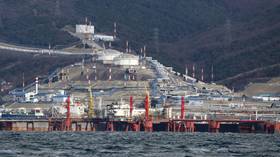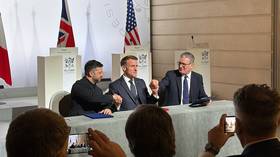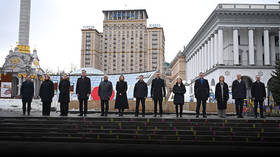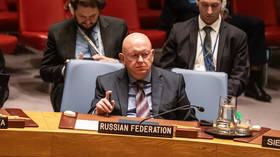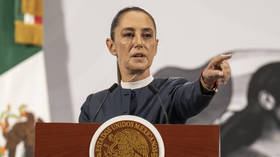US ‘abandoning its constitutional principles’ on Gitmo
As the Pentagon confirmed the number of Guantanamo Bay prisoners on hunger strike has doubled since last week, former congressman Dennis Kucinich told RT the situation highlights a failure to confront decisions made in the heat of the US War on Terror.
RT:We have seen the Pentagon upping the number of detainees who are on hunger strike to 25 - what does that tell us? Are they caving to media pressure?
Dennis Kucinich: We should be concerned. This is a serious human rights issue, and we also have a question of America - my beloved country - abandoning its constitutional principles, because when prisoners are under US control and discretion they should have the same rights that any other prisoner would have. They should have the right to be told the charges against them, the right to a speedy trial, right to habeas corpus, which would enable them to be released if charges against them can’t be levied. This is a black mark on our beloved nation, and the hunger strikes only point out how dire it is.
RT:President Obama has promised to close Guantanamo for a long time now - and most of the inmates have been cleared for release already. Why is this still an issue?
DK: This is the limitations of American politics. We got into a war based on lies - the War on Terror - and it’s taken us on an aggressive path globally, and part of the problem is we end up putting together these secret sites with rendition, or in Guantanamo’s case a site that we know exists with prisoners who haven’t even been charged.
It is continuing because our political process has failed to
come to terms with the rationale for war, with the so-called global
war on terror, and what to do with people who you’ve held in
captivity without charge. If they’re so threatening, where is the
information about what they’ve done? And if they’re not
threatening, why are we
holding them? This is right out of the writer Franz Kafka.
RT:As a former Congressman, what do you think would need to happen for Guantanamo to close?
DK: The president has to make the decision, it’s an executive decision, and I would say he has the ability to do that. It’s his discretion - you know, look, try this, it costs about two thousand dollars a day per prisoner to be able to hold people at Guantanamo.
Now, in order to put someone in a maximum security prison in the
United States it costs a fraction of that. We have a problem here,
which is not a law enforcement problem - it’s a human rights
problem,
it’s a constitutional problem.
And so we have to come to terms with that, and President Obama is going to have to step up and make the decision to close Guantanamo - as he’s promised - and to move forward to direct these prisoners to various sites within the reach of... the jurisdiction of the United States and charge them, so that they can move forward. And if he can’t charge them, you have to do what you do in any case, which is, if you can’t charge someone you release them. We have no right to hold people indefinitely without charges, without a trial, and without access to a justice system. It’s against every principle of law which exists in the world.
RT:The prison at Guantanamo is a child of the war on terror - among other things like Internet surveillance and the PATRIOT Act. How long will the consequences of this war last?
DK: Well, keep in mind that the president last year
signed a directive that kept the United States technically in a
state of emergency, that was first declared right after 9/11. So
the United States is still groping through the darkness of
extra-constitutional decisions, of rules that have sharply
constrained the exercise of our constitutional privileges, of a
government that’s more involved in spying, of a government that is
interested in what people are ... in their educational records, in
their financial records, a government which has given the FBI
extraordinary powers. We have a problem here, we’ve got to regain
our liberties, we’ve got to start to listen to the concerns that
the American people have about a country which has prided itself on
its institutions providing freedom, starting to lose
that freedom.
RT:Looking back at the history of Guantanamo, has it provided any assistance at all with the battle against terrorism?
DK: Look, I think that question answers itself. It is my
opinion that the more we move this war on terror globally the more
security risks the United States has.
The statements, views and opinions expressed in this column are solely those of the author and do not necessarily represent those of RT.




